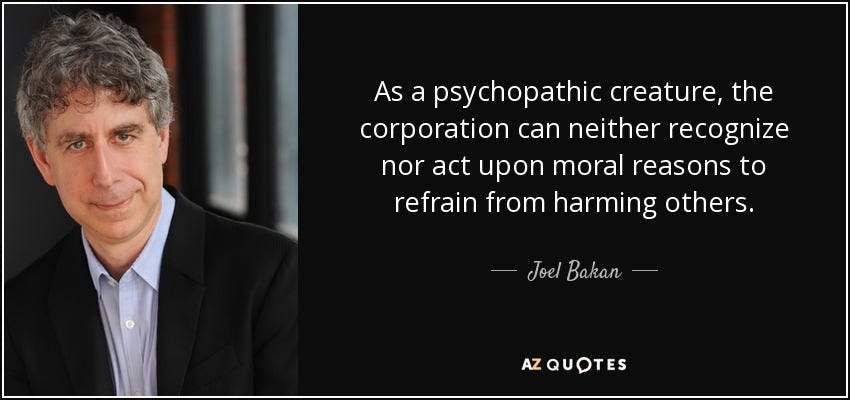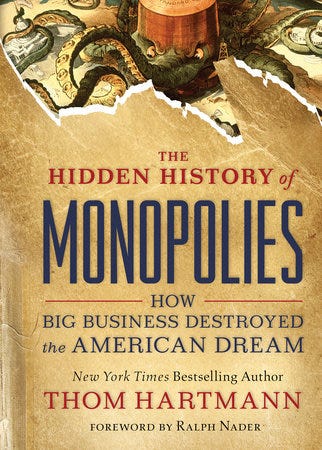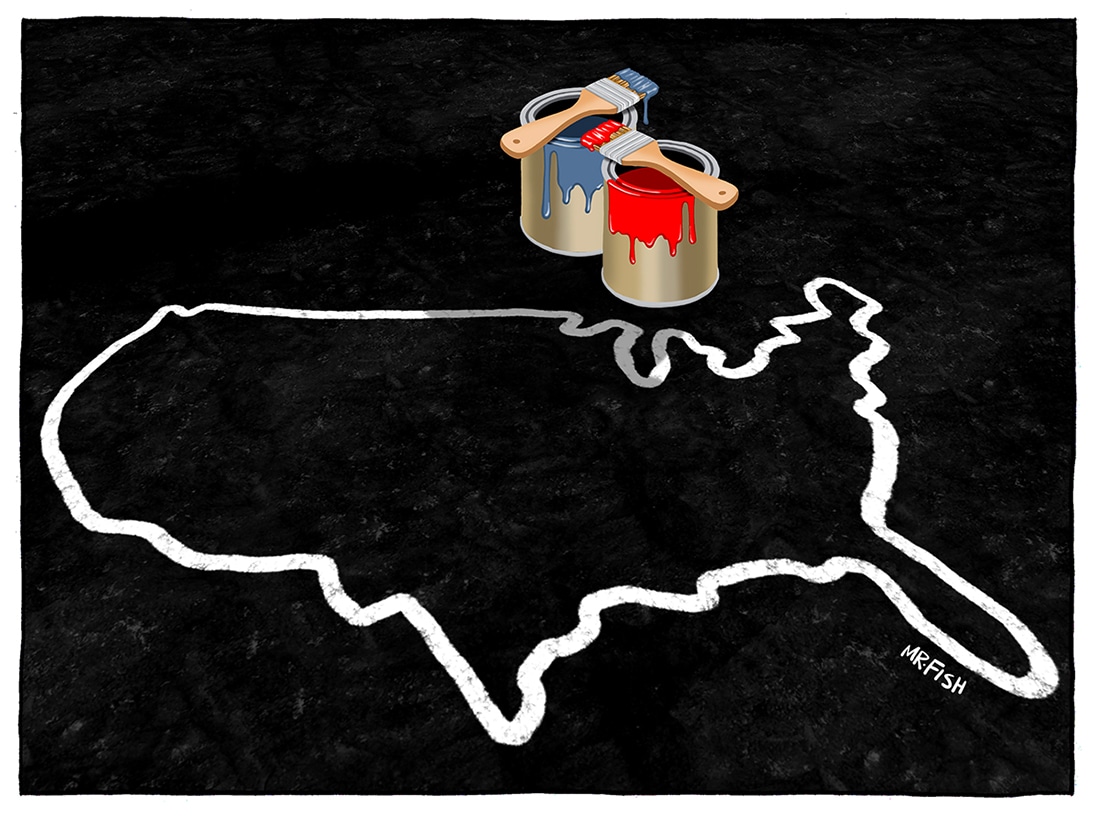

Death by Pinto (source)
Bring Back the Corporate Death Penalty
by Thomas Neuburger | Jun 12, 2024
“All powers and franchises of corporations are derived from the people and are granted by their agent, the government, for the public good and general welfare, and the right and duty of the state to control and regulate them for these purposes is hereby declared. The power, rights and privileges of any and all corporations may be forfeited by willful neglect or abuse thereof. The police power of the state is supreme over all corporations as well as individuals.”
—Wyoming Constitution
And the Lord said to him “How can you say ‘I have performed the law and the prophets’? seeing that it is written in the law ‘Thou shalt love thy neighbor as thyself,’ and look, many of your brothers, sons of Abraham, are clad with dung, dying for hunger, and your house is full of much goods, and there goes out therefrom nought at all unto them.”
—Jesus, from the Gospel of the Nazarenes, quoted here
In fact, in the capitalist USA, corporations can kill to make money. Even ChatGPT knows this. From the ChatGPT client built into Kagi Search:
Based on the available information, there are several examples of corporations engaging in unethical or harmful practices to increase profits, even to the point of causing deaths:
- Coca-Cola has been accused of killing trade unionists in Latin America. [1]
- General Motors built vehicles known to catch fire, putting lives at risk. [1]
- Tobacco companies suppressed information about the cancer-causing effects of their products. [1][2]
- Philip Morris lobbied the Czech government to not reduce smoking, arguing that smokers dying younger would save the government money. [3]
- Monsanto (now part of Bayer) has been described as one of the “most evil” corporations, with a business model that has led to deaths. [4]
- There are numerous other examples of corporations knowingly producing unsafe products, suppressing information, and even using armed force, all in the pursuit of profits at the expense of human lives. [2][5]
So in summary, the available evidence indicates that some corporations have indeed been willing to kill or cause deaths in order to increase their profits and financial gains. [6][7]
These are the footnotes referenced above:
- Corporations Would Literally Kill You to Turn a Profit – Jacobin
- Right, We Almost Forgot: Corporations Also Kill People – Demos
- Corporations Would Literally Kill You to Turn a Profit – Reddit
- If it was legal, would businesses kill you for profit? – Quora
- How U.S. businesses profit from war worldwide | The Reynolds Center
- List of corporate collapses and scandals – Wikipedia
- Corporatocracy – Wikipedia
These statements could easily be made about the murderous Ford Motor Company (see image and link above) or General Motors. In fact, quite a few corporations get away with murder, either because they’re protected by their corporate personhood (think about that), or because no one can prove intent on behalf of their executives.
Living With Predators
If a human lived only for money, were willing to kill for money, placed money before protecting the lives of anyone else, designed their entire life around getting more rich … what would you call that person?
A psychopath, and a dangerous one.
Would it then surprise you to learn that, according to one study, 12% of corporate leaders are on the psychopathic spectrum? That explains a lot. Especially when you consider that our post-Reagan, “greed is good” culture normalizes and rewards these traits.

We live among predators, and we honor them. That we don’t drive them out of our lives and away from us and our children (think what they’re going to our shared climate future) — that is our fatal flaw. When millions, or billions, are dead while Exxon stays rich, the greed we allowed in our rulers will be the main cause. We, through our billionaire masters, cause our own deaths.
The solution? Thom Hartmann, in the excellent piece below, offers one simple fix: Bring back the “corporate death penalty.” It used to exist and still does; it’s just never applied in our worshipful, post–rich and famous world. (All emphasis below is mine.)
While the human death penalty has largely disappeared in the world and is fading in the United States (a good thing), the corporate death penalty needs a revival.
The corporate death penalty, widespread in the 19th century, is a political and economic process that weeds bad actors out of the business ecosystem to make room for good players. The process of revoking corporate charters goes back to the very first years of the United States. After all, the only reasons that states allow (“charter”) corporations (normal business corporations can be chartered only by a state, not the federal government) are to serve the public interest.
As the Wyoming Constitution of 1889 laid out:
All powers and franchises of corporations are derived from the people and are granted by their agent, the government, for the public good and general welfare, and the right and duty of the state to control and regulate them for these purposes is hereby declared. The power, rights and privileges of any and all corporations may be forfeited by willful neglect or abuse thereof. The police power of the state is supreme over all corporations as well as individuals.72
When a corporation does business ethically and legally, it serves its local community, its employees, its customers, and its shareholders. For over a century, American corporations were held to this very reasonable standard.
Beginning in 1784, Pennsylvania demanded that corporations include a revocation clause in corporate charters that automatically dissolved them after a few decades so they couldn’t grow so large or so rich as to become a public menace. It also authorized the state to dissolve any corporation that harmed the state or its citizens, including harms to customers and employees.
“Nor shall any charter for the purposes aforesaid be granted for a longer time than twenty years,” Pennsylvania’s corporate law read, “and every such charter shall contain a clause reserving to the legislature the power to alter, revoke, or annul the same, whenever in their opinion it may be injurious to the citizens of the commonwealth” (Article I, Section 25).73
As the United States grew, the federal government passed laws requiring corporate-death-penalty revocation clauses in the state corporate charters of insurance companies in 1809 and banks in 1814. By the late 1880s, every state required them for all business corporations.
From the founding of America to today, governments routinely revoked corporate charters, forcing liquidation and sale of assets, although it’s been over a century since such efforts have focused on corporations large enough to have amassed financial and, thus, political power.
In the 19th century, banks were shut down for behaving in a “financially unsound” way in Ohio, Mississippi, and Pennsylvania. And when corporations that ran turnpikes in New York and Massachusetts didn’t keep their roads in repair, those states gave the corporations the death sentence.
In 1825, Pennsylvania passed laws making it even easier for that state to “revoke, alter, or annul” corporate charters “whenever in their opinion [the operation of the corporation] may be injurious to citizens of the community,” and by the 1870s, 19 states had gone through the long and tedious process of amending their state constitutions expressly to give legislators the power to terminate the existence of badly behaving corporations that originated or operated in those states.
Candidates have even run for public office (for example, Senator Elizabeth Warren in the 2020 Democratic presidential primary) and done very well or won on platforms including the revocation of corporate charters. One of the largest issues of the election of 1832 was Andrew Jackson’s demand that the corporate charter of the Second Bank of the United States not be renewed.
Following that lead, states all over the nation began examining their banks and other corporations, and in just 1832, the state of Pennsylvania pulled the corporate charters of 10 corporations, sentencing them to corporate death “for operating contrary to the public interest.”
Oil corporations, match manufacturers, whiskey trusts, and sugar corporations all received the corporate death penalty in the late 1800s in Michigan, Ohio, Nebraska, and New York, among others.
President Grover Cleveland invoked the mood of the times in his 1888 State of the Union address when he said:
As we view the achievements of aggregated capital, we discover the existence of trusts, combinations, and monopolies, while the citizen is struggling far in the rear or is trampled to death beneath an iron heel. Corporations, which should be the carefully restrained creatures of the law and the servants of the people, are fast becoming the people’s masters.74
Today, all of the states still have laws that allow them to impose the corporate death penalty; it’s just been decades since these laws have been used against a large corporation. (Small companies are routinely shut down by secretaries of state, sometimes for malfeasance but mostly just because they’ve become inactive or failed to pay their taxes.)
Corporations have successfully argued before the Supreme Court that they should have First Amendment rights of free speech, Fourth Amendment rights of privacy, Fifth Amendment protections against takings, and 14th Amendment rights as “persons” to “equal protection [with you and me] under the law,” among other “rights of personhood.”
It’s long past the time that these “persons,” when they become egregious and recidivist criminals (and particularly when they repeatedly kill people), be treated the same as human criminals: remove them from society permanently. New, smaller, more innovative companies can fill the spaces now occupied by bloated corporate criminals. The result will be (as it was after AT&T was broken up in the 1970s for violating anti-monopoly laws) an explosion of innovation, competition, and opportunity.
If enough corporate criminals are targeted, the American business renaissance could spread across industries including media, pharma, airlines, tech, banking, insurance, food, chemicals, oil, and beyond.75 It would be a real stimulus, meaningful and long-lasting: it’s time for our states to start enforcing the corporate death penalty.






0 Comments